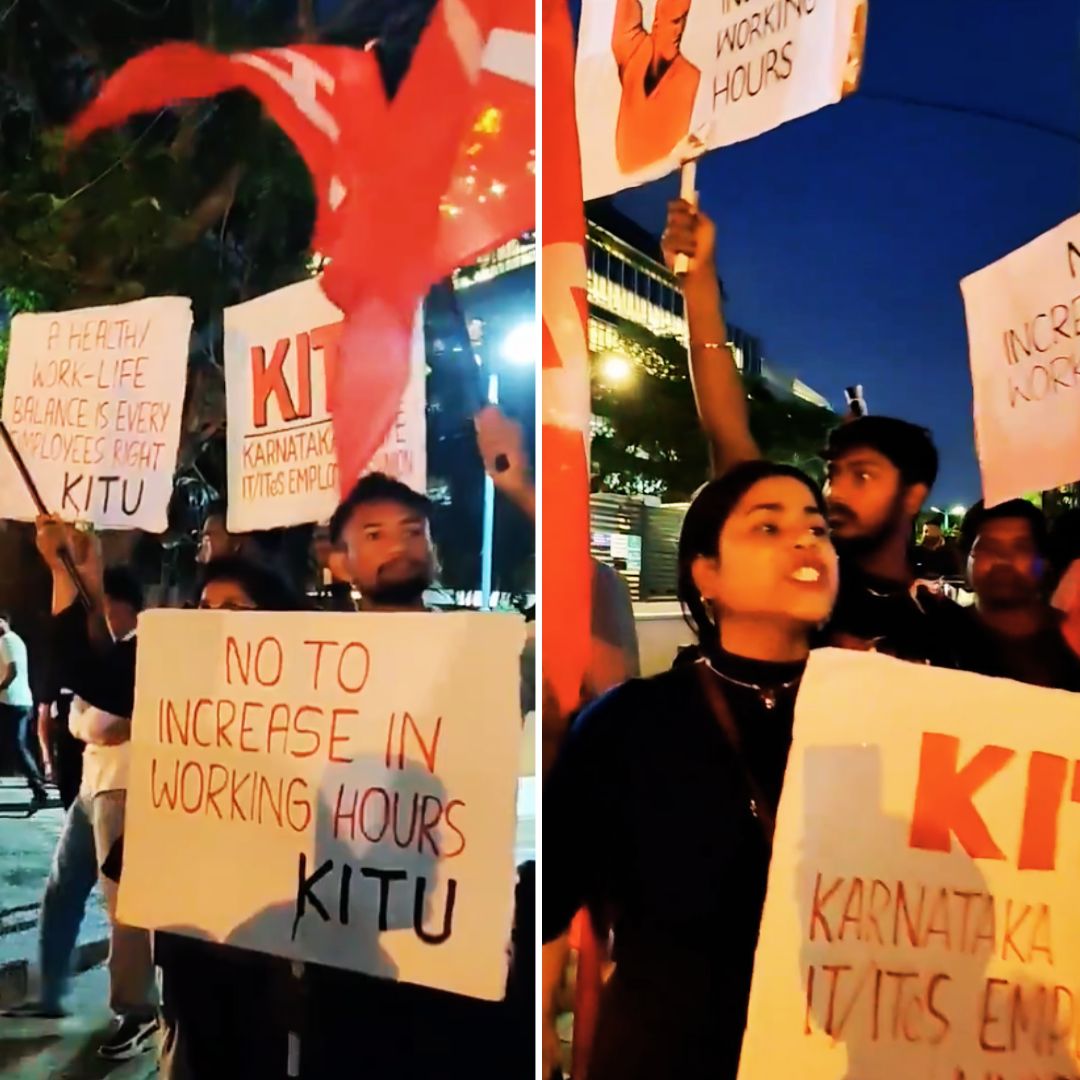IT employees in Bengaluru, represented by the Karnataka State IT/ITeS Employees Union (KITU), staged strong protests at Global Tech Park and announced plans for further demonstrations in Whitefield. Their primary opposition is to the Karnataka government’s proposed amendment to labour laws, which could allow for increased daily working hours in the IT sector.
While the labour department maintains that the 48-hour weekly cap on working hours will remain intact, employees fear that the reforms could effectively legalise 12-hour shifts, leading to higher levels of burnout, mental health issues, and job insecurity.
The government defends the move as providing flexibility for both employers and employees, but trade unions are outraged, calling the proposal “modern-day slavery” and warning of severe consequences for work-life balance and workers’ rights.
Workers Rally Against “Modern-Day Slavery”
On June 18, 2025, over 100 IT professionals gathered in front of Global Tech Park in Bengaluru, carrying placards and chanting slogans such as “No to 12-hour shifts” and “Protect our work-life balance.”
The protest was organised by KITU, with support from other workers’ collectives and trade unions. The mood was defiant, as employees expressed frustration over what they see as a direct threat to their well-being and job security.
KITU leaders, including prominent figures Suhas Adiga and Lenil Babu, addressed the crowd and later participated in a meeting with the labour department and industry representatives. During the meeting, Adiga stated, “The government is attempting to normalise inhuman conditions.
This amendment is not about productivity—it’s about pleasing corporate bosses by turning human beings into machines.” Union representatives argued that the proposed changes could allow companies to reduce the number of shifts from three to two per day, potentially resulting in the elimination of one-third of the workforce and a further erosion of job security.
The protestors also highlighted the lack of effective overtime compensation and the prevalence of unpaid extra hours in the sector. Many employees shared personal stories of mental health struggles and burnout, citing the pressures of long working hours and high expectations.
Official Statements and Ongoing Protests
The Karnataka labour department has sought to reassure employees by stating that the proposed amendments to the Karnataka Shops and Commercial Establishments Act will not breach the 48-hour weekly limit for working hours. However, employees and union leaders remain sceptical.
One IT employee explained, “Even if you cap the week at 48 hours, that still averages to about 9.6 hours over five days. Add the legalised overtime—about 2.5 hours per day—and we’re back to 12-hour shifts. And overtime compensation? It doesn’t exist in practice.”
The government argues that the reforms are intended to provide flexibility for both employers and employees, especially in an industry that operates round the clock to serve global clients. Officials have also pointed to the need for Karnataka’s IT sector to remain competitive in a rapidly changing global market.
Despite these assurances, KITU and other unions have announced continued protests in Whitefield, another major IT hub in Bengaluru. The All India IT & ITeS Employees’ Union (AIITEU) has joined the opposition, calling for proper inspection and protection of workers’ rights. Union leaders have warned of an impending crisis for the sector’s young workforce if the amendments are passed.
Background and Wider Implications
This is not the first time Karnataka’s IT workforce has faced proposals to increase working hours. In 2024, a similar plan to allow 14-hour workdays was scrapped following massive protests and widespread criticism. The current proposal has reignited fears among employees, who cite alarming mental health statistics. According to the State Emotional Wellbeing Report 2024, nearly 90% of corporate employees under the age of 25 suffer from anxiety or stress-related disorders.
Unions have pointed to global trends where countries are recognising the “right to disconnect” as a fundamental right, allowing employees to switch off from work-related communications outside of working hours. In contrast, Karnataka’s proposed reforms risk moving in the opposite direction, potentially setting a dangerous precedent for other states and industries.
The controversy has also sparked a wave of memes and social media discussions, with many users mocking the proposal as “Narayana Murthy hours,” a reference to previous calls by industry leaders for longer workdays. The public discourse highlights the growing disconnect between the expectations of corporate leadership and the lived experiences of employees.
The Logical Indian’s Perspective
At The Logical Indian, we firmly believe that the well-being of workers must be at the heart of all labour reforms. The proposed changes to working hours in Karnataka’s IT sector risk normalising exploitative practices and undermining decades of progress in labour rights. We stand with Karnataka’s IT professionals in their fight for fair working hours, mental health protections, and dignity in the workplace.
We advocate for a workplace culture that values empathy, dialogue, and positive social change. Employers, employees, and policymakers must work together to find solutions that promote innovation and growth without sacrificing the health and happiness of workers.
As we encourage constructive dialogue, we ask our readers: How can employees, employers, and policymakers work together to ensure that progress in the tech sector does not come at the cost of workers’ physical and mental well-being?










